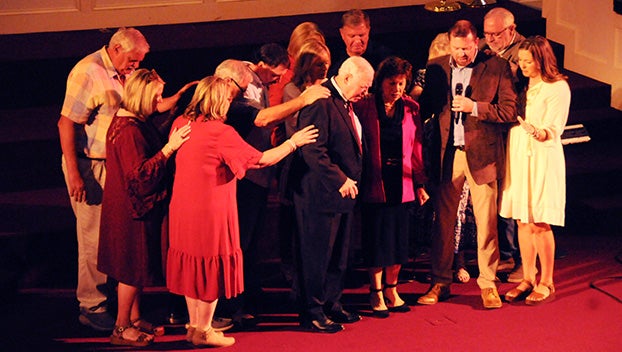Preach the words of the Lord
Published 10:55 am Monday, February 14, 2011
“Preach the Word; be prepared in season and out of season; correct, rebuke and encourage— with great patience and careful instruction.”
– 2 Timothy 4:2
In this text, the Apostle Paul reminds us today of the importance of Biblical preaching. Biblical preaching is marked by three elements: conviction, warning and appeal (“correct, rebuke, and encourage”). Warren Wiersbe explains it well, “True preaching is the explanation and application of Bible doctrine. Anything else is just religious speechmaking.”
In general, evangelical worship has been described as being “an inch deep and a mile wide.” In other words, many churches try to please everybody, but offer no in-depth teaching. It is quite possible to attend a worship service in any number of self-proclaimed evangelical churches today and find that the Bible may be barely read or even referred to at all! And far too many sermons make little, if any reference to the Word of God!
The problem is that we live in age where there is a distrust of anything or anyone who claims to speak with authority. Young pastors particularly may struggle in such an environment of distrust and begin to preach sermons based on what people want to hear rather than on what God has to say.
When the pews control the pulpit, the result may be what we find in verse 3 of this same text: “For the time will come when men will not put up with sound doctrine. Instead, to suit their own desires, they will gather around them a great number of teachers to say what their itching ears want to hear.”
The exposition of scripture is also undermined by a fascination with the latest so-called “prophetic word,” which does not find its origin in scripture. In this case, a preacher will read scripture, close the Bible and then preface his or her unbiblical remarks with, “This is what God is saying to us today.”
Among churches today there are generally three types of sermons. First, the topical sermon takes only its topic or main subject from the Bible. It is organized around the nature of the subject, rather than the text.
There are certainly times when the topical sermon is appropriate, such as addressing the Biblical view of finances during these hard times. And many great topical sermons brought us comfort after the 9/11 terrorist attacks on our nation. The great advantage of the topical sermon is flexibility and relevance.
Second, we have the textual message, which takes its topic and main points from the text. A textual message may explain some verses, but it does not get its main ideas from any one text.
Both topical and textual messages have distinct advantages. They are very useful for explaining particular subjects from a Biblical point of view and they are appropriate for settings where Bibles may not be available, such as weddings, funerals, etc.
Third, we have the expository sermon, which takes its topic and main ideas from the text. In the expository sermon the preacher makes a commitment to explain verse-by-verse what the particular text before him means. No significant portion of that particular text is ignored and the preacher stays within the boundaries of explaining that particular text.
Here at First Presbyterian Church, I usually preach an expository sermon, and I preach through particular books of the Bible, rotating back and forth from the Old and New Testaments. The advantages of this method are numerous. First, you tend to get preaching that is Christ-centered, rather than man-centered, because the preacher is striving to stay within the confines of the text and show you its redemptive focus. Second, you have the opportunity to cover more of the whole counsel of God. Third, topics are not driven by popular demand, but by what comes up next in the text. “Unpleasant” topics are not avoided, because they naturally come up in the course of study.
In our troubled and uncertain times the need for expository preaching to meet the spiritual needs of our nation has never been greater – so away with “religious speechmaking” – “three stories and poem!” Encourage your pastor to “preach the Word!”
May God bless you and your church. And if you have any questions, feel free to call me at 368-5453.
Jim Thorpe is the pastor at First Presbyterian Church in Atmore.




